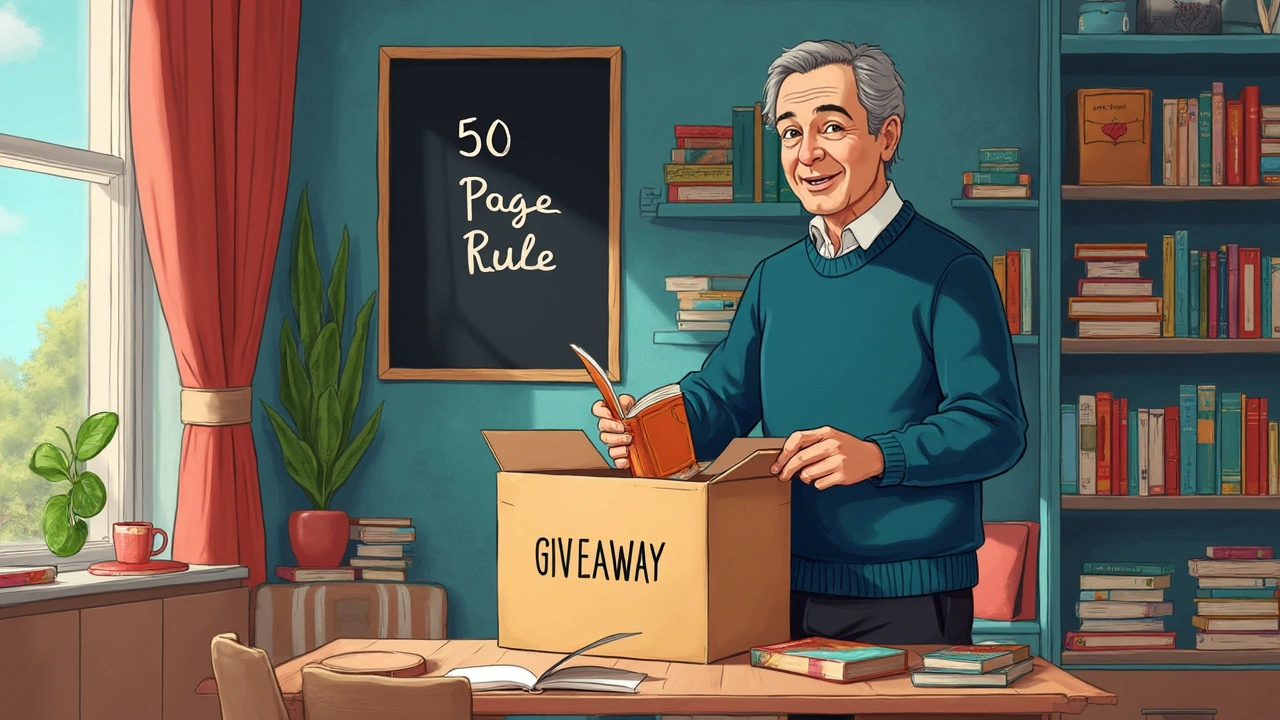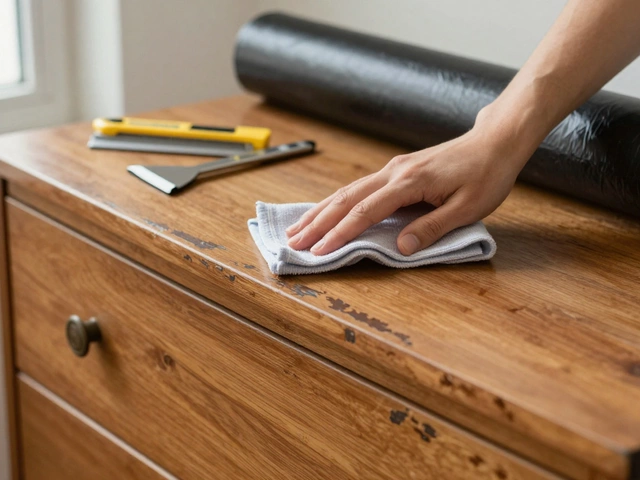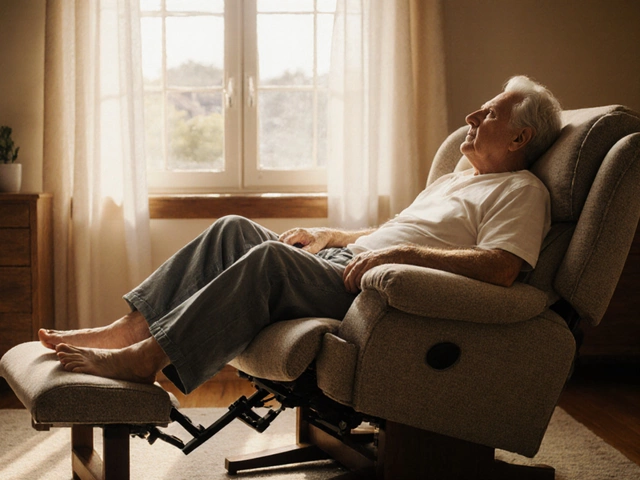Ever stared at a stuffed bookcase and wondered how many of those books you’ll actually finish? The 50 page book rule is a game-changer for anyone tired of feeling weighed down by half-read or untouched books. The rule is simple: If a book hasn’t grabbed you by page 50, you can put it down guilt-free. No more slogging through out of obligation, no more shelf space wasted on books you’ll never love.
Sounds straightforward, right? It works because life’s too short for books that bore you—and there’s always another story out there that might spark real excitement. This approach doesn’t just help with reading, it also makes organizing your bookcase way easier. You get more space for the stuff you actually care about, and less clutter from guilt-trapped paperweights. Applying this rule keeps your book collection fresh, personal, and way less overwhelming.
- What is the 50 Page Book Rule?
- Where Did the Rule Come From?
- Benefits for Your Bookcase and Mind
- How to Use the Rule When Buying or Keeping Books
- Tips for Decluttering with the 50 Page Rule
- Real Life Examples and FAQs
What is the 50 Page Book Rule?
The 50 page book rule is as obvious as it sounds, but it's honestly a lifesaver: give a book 50 pages to grab your attention. If you still don't care about the characters, the story, or the topic, set it aside. Don’t force it. This trick started popping up in book circles and reading blogs a few years ago, inspired by advice from seasoned readers and even librarians. The idea caught on fast because it made reading less stressful and helped people manage those overflowing shelves.
It’s not about quitting on a book too soon. Fifty pages is enough space for most stories—fiction or nonfiction—to show what they've got. If you're still bored out of your mind or just not engaged after that point, odds are the book won’t suddenly get better. Instead of keeping books "just in case," the rule lets you decide earlier. That freeing feeling you get? That’s the point.
This approach fits perfectly if you want a cleaner, more enjoyable bookcase. No more stacking up half-read books because you feel guilty abandoning them. It’s a practical way to only use shelf space for the titles you actually like or plan to finish. No more pretending you’ll read something just because it looks “smart.” Plus, you can be honest with yourself about what you actually want to read.
The 50 page rule is also used by people who review books, because it saves time and keeps them focused on quality picks. It works for anyone—kids, teens, adults—no matter how much or little you read. You can even adjust the rule if you want. Some folks set their own page limit, like 30 or 100. The point stays the same: don’t feel stuck with books that don’t work for you.
Where Did the Rule Come From?
The 50 page book rule isn’t something cooked up by a bunch of picky readers on the internet. A lot of book lovers point to Nancy Pearl, a well-known librarian and author, as the one who really spread this idea. She called it the "Rule of 50" back in the early 2000s. Pearl wanted people to feel free walking away from books that just weren’t working for them. Her thinking? Not every book fits every reader, and there’s too much good stuff out there to waste time being bored or frustrated.
The rule really took off after Pearl mentioned it in her book "Book Lust: Recommended Reading for Every Mood, Moment, and Reason" in 2003. In that book, she told readers straight up: if you’re not hooked by page 50, move on. Since then, loads of readers, book clubs, and bloggers have adopted it as a shortcut for sorting the keepers from the duds.
Not everyone sticks strictly to 50 pages, of course. Some folks make it 30, some 100, depending on genre or even mood. But the 50-page mark feels right to a lot of people—it’s enough time to figure out if you click with the writing, characters, and topic.
Here’s a quick look at how readers go about using and tweaking the rule:
- Non-fiction lovers may give up earlier if a book is dry or repetitive.
- Fantasy fans sometimes stretch the rule, since world-building can take more pages.
- Busy readers feel good about having a solid number that lets them move on without guilt.
And check this out—according to a 2022 survey from Goodreads, nearly 38% of readers said they’ve stopped reading a book before the halfway mark because they lost interest. That lines up with what the 50 page rule is all about: no shame in moving on.
| Source | Year | Percentage Who Quit a Book Early |
|---|---|---|
| Goodreads Survey | 2022 | 38% |
| Pew Research | 2021 | 34% |
So, next time you’re on page 47 and still not feeling it? Remember, you’re in good company—and the rule has some real roots.
Benefits for Your Bookcase and Mind
The 50 page book rule doesn’t just free you from boring reads—it also clears real, physical space in your home. Most bookcases aren’t giant, and even with careful stacking, shelves get full fast. Let’s face it, nobody wants to dust around books they secretly can’t stand. By moving on early from those duds, you open up your shelves for stuff you genuinely like. Plus, your bookcase turns into a statement about what actually interests you right now, not just leftovers from forgotten reading plans.
There’s a mental side to this, too. Clutter stresses people out, and research from UCLA shows that physical mess in homes is linked to higher anxiety. When you cut out the books that feel like chores, your bookshelf starts to look like an invitation instead of a to-do list. You’re more likely to reach for something you enjoy, which means reading turns back into a pleasure, not a task.
As book critic Nancy Pearl puts it, “If you don’t like a book after fifty pages, stop reading it. There are too many great books out there to waste time on mediocre ones.”
If you don’t like a book after fifty pages, stop reading it. There are too many great books out there to waste time on mediocre ones. – Nancy Pearl, Librarian and Author
This mindset also helps with letting go of guilt. It’s common to keep books just because you spent money on them or because they’re ‘classics’ you feel you should finish. Using the 50 page book rule makes it okay to say, “Not for me,” and move on.
- Reduce clutter and keep only books you love.
- Lessen decision fatigue—less is more when you can actually see your favorites.
- More enjoyable reading means you actually finish more books.
- Your home can feel lighter and more personal, not crammed with old obligations.

How to Use the Rule When Buying or Keeping Books
Applying the 50 page book rule to shopping or culling your bookcase stops you from getting stuck with books you’ll never actually enjoy. Most people feel pressured to finish every book they start, but your bookcase shouldn’t be a guilt trap.
So, here’s how to make this rule work for you — both at the store and at home:
- When buying books: Try to read the first 10-20 pages before you commit. If possible, hit up a library or bookstore where you can sample the start. If you’re yawning or your mind is drifting before you’re even halfway to page 50, move on. There’s no rule saying you have to buy it just because it’s a bestseller or looks good on Instagram.
- When keeping or culling books: Pull the book from your shelf, set a bookmark at page 50, and start reading. If you’re still not hooked at page 50, put it in the giveaway pile—no guilt. If you hesitate because you "might" get into it someday, remember: shelf space is valuable and your time matters even more.
This rule turns "maybe someday" into a yes-or-no decision, saving you space and decision fatique. Stop worrying about being a quitter; you’re just making your bookcase (and your reading time) work better for you.
Curious how this stacks up against typical reading habits? Here’s a quick look:
| Habit | % of Readers |
|---|---|
| Finish Every Book | 42% |
| Quit Books After 50 Pages | 29% |
| Quit Books Whenever | 26% |
| Never Quit Books | 3% |
That’s right—almost one in three readers already use some version of the 50 page rule. You’re not alone, and applying this thinking to buying and keeping books can make a serious difference on your overcrowded bookcase and your enjoyment.
And if you’re eyeing your book pile thinking, "But what if I miss a masterpiece?" Just remember: your 50 page book rule means you’re setting the bar for what counts as a masterpiece for you. Not every book is for every person, and that’s the beauty of it.
Tips for Decluttering with the 50 Page Rule
Applying the 50 page book rule isn’t just about personal reading freedom—it can totally transform your bookcase from a clutter magnet to a spot you’re actually excited to look at. Here’s how to make it work for you, step by step.
- Pick a spot: Start with one bookcase, shelf, or a pile on the floor. Big or small, it doesn’t matter—just don’t try to tackle your whole home library at once. (Studies show people have better luck staying organized when they work in zones.)
- Sort your books: Grab all the books you haven’t finished—and be honest with yourself about which ones you even started. Make a “To Try” pile.
- Read or skim the first 50 pages: If you’re not feeling it, set it aside. Only keep the books that make you want to turn page 51. This step is the heart of the rule and helps you filter out the dead weight without guilt.
- Decide what stays: Put the books you love or want to finish back in your bookcase. Move the rest to a different pile. This cuts down on clutter and leaves space for new reads you'll actually pick up.
- Let go guilt-free: Donate, trade, or sell the books that didn’t spark your interest. According to the American Library Association, about 1.7 billion books are donated every year—you’re not alone in passing books along!
- Use a sticky note or bookmark to mark the page you left off on, so you can be honest when checking your "To Try" pile.
- If you’re short on time, try reading the first chapter or first 25 pages, and then revisit when you can.
- Host a book swap with friends, so the books you pass on get a new home.
- Keep a "maybe" box for books you’re still on the fence about and review them every few months.
Check out how your book collection might shift after making these tough calls. Here’s a quick look at how one tight shelf improved when the 50 page rule was put to use:
| Shelf Status | Before Rule | After Rule |
|---|---|---|
| Number of books | 70 | 36 |
| Unread books | 24 | 7 |
| Books finished in last year | 13 | 28 |
It feels good to clear out what you’re not going to read and focus on the books that bring you joy. If you want your bookcase to show off what matters most, the 50 page book rule is honestly one of the easiest ways to cut through the noise and reclaim your space.
Real Life Examples and FAQs
The 50 page book rule isn’t just one of those trendy ideas that floats around on Reddit and then fades. People have actually changed their reading habits and their shelves because of it. Let’s look at how folks use this rule—and the questions that pop up most often.
First, here’s a real story: Jenna, a busy parent and tech worker from Chicago, used to have a shelf with 82 unread books—yes, she counted. After following the 50 page book rule for a year, she donated 35 books that didn’t get past her 50-page test. Her shelf is now about half its original size, and she says she actually enjoys choosing her next read instead of feeling overwhelmed.
Bookstagram users have also shared before-and-after shots—a quick scroll online and you’ll see posts of cleared, color-coded shelves with captions about finally ditching books that dragged. There’s this fun thing in some book clubs where members swap books that “failed the 50-page test,” so someone else might find a gem in what didn’t click for you.
| Scenario | Result After Using 50 Page Rule |
|---|---|
| Home bookshelf with 120+ books | Reduced to 65 books loved or re-read |
| Monthly book club picks | Less frustration, more honest discussion |
| Kids’ shared bookcases | No more arguing over boring books—kids choose! |
Let’s tackle the FAQs I hear most:
- What if I stop reading too soon? Most folks worry a great book might take 100 pages to warm up. You can set your own number, but 50 pages is usually enough to get the vibe. If you miss a winner, no shame in coming back later.
- Should I feel guilty donating half-read books? Not even a little. Libraries, used bookstores, and little free libraries all love donations. Someone else might love what bored you.
- What about expensive or gifted books? This one’s tough. Maybe keep a small section for gifts, but still be honest: a book that never speaks to you just takes up space you could use for your favorites.
- Can I use the rule with audiobooks or eBooks? Totally. Just use chapters or time as your marker if page numbers don’t match up.
- How do I stay consistent with the rule? Make it a habit: write the page number where you stopped on the last page you read. If you ever try again, you’ll know where you left off.
Bottom line—people who use the 50 page rule aren’t just reading more, they’re reading happier. Their bookcases finally show what they actually enjoy, instead of what they feel they should have read.





